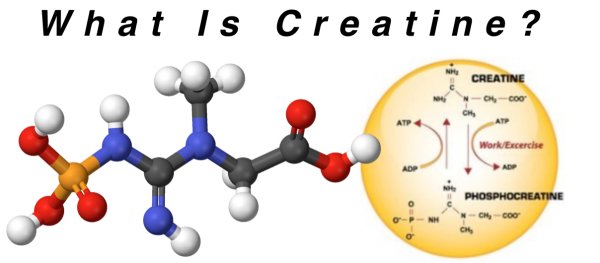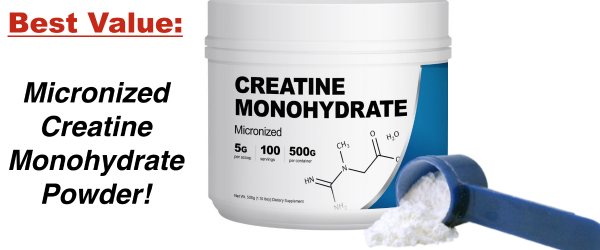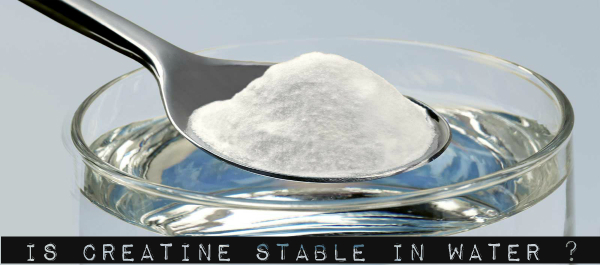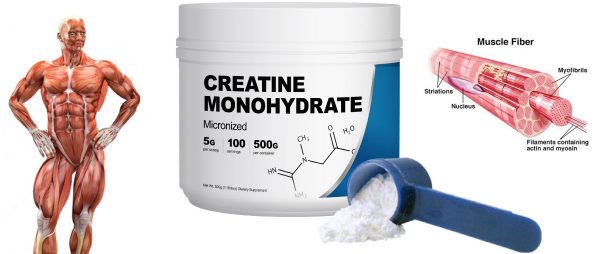Of all the bodybuilding and nutritional supplements on the market, one of the most talked about products is “Creatine”.
And there is a good reason for that because creatine is one of the few supplements on the market that can produce a noticeable enhancement in strength and lean muscle gains in a relatively short period of time.
I get more questions about creatine
than any other supplement,
questions such as…
– What is creatine?
– Does creatine really work?
– What is the best kind of creatine?
– Are there any side effects from taking creatine?
– Is creatine safe?
– Does creatine damage the kidneys?
– Can teenagers take creatine?
– Does creatine help build muscle?
– Does creatine help burn fat?
– How do you take creatine?
– Should you cycle creatine?
– Do you need to load with creatine?
– Is creatine stable in water?
– Should you take creatine before or after your workout?
– Can you drink coffee while taking creatine?
– Etc, etc, etc…
These are the most popular questions that I keep hearing over and over again. So in this article I’m going to answer all these questions and cover the whole “Creatine Supplement Info 101” to help you understand exactly what creatine is, what it isn’t, and how you can use it to get better muscle building results in the gym.
Q: What Is Creatine?

Creatine is a natural combination of 3 amino acids (arginine, glycine, and methionine). These amino acids are naturally found in foods like meat and fish. They help to regenerate adenosine triphosphate (ATP), which is the energy that is stored in the muscle cells. Creatine enhances physical performance by increasing the number of times that ATP energy can be recycled during physical exertion without increasing the absolute amount of ATP stored within our muscles.
The body can produce creatine by assembling the amino acids arginine, glycine, and methionine. However, the actual amount of creatine that is produced is minimal because it is quite low on the list of priority’s of metabolic functions for the body. There are numerous other proteins that need these amino acids that are more critical to our survival than creatine.
After all building a big muscular physique isn’t really high on the body’s priority list either. In nature having excess muscle mass increases the metabolic rate, and from a survival point of view this is a “waste” of calories and nutrients. So in order to reap the muscle building benefits that creatine has to offer we need to supplement our diets with creatine.
Q: Does Creatine Really Work?
Yes, creatine “Really Does Work”…
When creatine is ingested into the body and taken up by the muscle cells, it binds with a phosphorus molecule to create creatine phosphate. It is then either used during muscular contractions or stored in the muscle cells. The more phosphocreatine that is stored in your muscles cells, the more potential energy each muscle cell has available. This equals a more powerful muscular contraction, more power output, and a higher tolerance for a greater workload.
The improvement in strength and energy when taking creatine supplements is usually obvious for most people. It is quite common to feel stronger in the gym and experience better muscle pumps within 1-2 weeks of taking creatine. You can think of ATP as the cell’s energy currency and phosphocreatine as a debit card with an adjustable balance – the balance being set by creatine deposit via the diet and creatine supplementation.
Q: What’s The Best Creatine?

There are many different types of creatine supplements on the market. The most common is Creatine Monohydrate. This is the predominant creatine supplement on the market. It is one of the earliest creatine products that gained wide popularity and made creatine world famous.
Over the years there have been other variations of creatine made such as Creatine Ethyl Ester (CEE), Micronized Creatine, Kre Alkalyn Creatine, Creatine Serum, Tri Creatine Malate, as well as several creatine mixtures where creatine is combined with other amino acids and supplements in a combo product. Some of the popular ones include: Cell Tech, NO-Xplode, Cell Mass, Super Pump 250, NO-Shotgun, etc.
With so many creatine options available it can be very confusing to know which one is “The Best Creatine” and which one you should use. Both from a cost effectiveness point of view and a physical performance and muscle enhancement point of view.
Some of the newer and more expensive kinds of creatine have been promoted as being better absorbed by the body, and thus producing better results than regular creatine. But for the most part these claims haven’t been backed up and supported by scientific studies. In fact some studies have actually found that some of these newer creatine supplements, such as Creatine Ethyl Ester, to be not as stable as regular creatine and even less effective.
My personal favorite and the one that I recommend to my coaching students is Creatine Monohydrate Powder, specifically Micronized Creatine. The only difference is that micronized creatine is processed into finer particles (up to 20 times smaller than regular creatine monohydrate). This makes micronized creatine easier to absorb and has a higher purity.
Not only is this a very high quality form of creatine, but it is also one of the most cost effective forms as well. You can literally get 1000 grams of Creatine Monohydrate for about $30. And this is enough to last you for over 3 months. It works out to about $0.30 per day to supplement your diet with creatine.
Even folks who are on a very tight budget can still afford to supplement their diet with Creatine Monohydrate Powder and reap all the muscle building benefits it has to offer.
Anther good creatine supplement is Kre Alkalyn Creatine. This is a buffered creatine that remains totally stable when mixed with liquid. So it reaches the muscles cells at full strength. You can get the same muscle building effects from a smaller doses of Kre Alkalyn Creatine than you can from Micronized Creatine, but even at the smaller doses Kre Alkalyn Creatine is still a lot more expensive than Micronized Creatine (about triple the cost).
I’ve personally used both forms of creatine with good results. But obviously Pure Micronized Creatine Monohydrate Powder gets my top vote because it is the best value for your money. However, some people with very sensitive stomachs may find that taking the higher doses of creatine monohydate (i.e. 10 grams per day) may cause more stomach irritation compared to taking a smaller doses of Kre Alkalyn Creatine (i.e. 3 grams per day).
So for people with a sensitive stomach and digestive issues, going with the higher priced Kre Alkalyn Creatine may be the better option. But most people can get just as good of results for a fraction of the cost with Pure Micronized Creatine Monohydrate.
Q: What Are The Side Effects Of Creatine?

It seems that anytime something shows promise for helping to enhance muscle growth or athletic performance people always assume that it must be “bad for you”. I think a lot of this flawed thinking has to do with steroids. People know that synthetic steroids can help improve athletic performance by building muscle and increasing strength, but when they are abused they also carry some negative side effects.
So when the average Joe hears about any supplement or product that can help improve athletic performance, he very often mistakenly thinks that there must be a downside to it as well (as in the case of steroids). But this is often NOT the case, especially with natural foods and food supplements.
In fact most foods and supplements that help build muscle, do so because they are actually “Good For You”. Most of the bodybuilding foods and supplements that people take provide the vital nutrients needed to enhance the immune system, aid with recovery, and improve your overall health and fitness. It’s all these positive health benefits stacked together that provide the muscle building benefits as well.
Creatine is NOT a steroid and it does NOT have any of the side effects of steroids. You are not going to lose your hair, get acne, have roid rage, fry your liver, or shrink your balls from taking creatine.
In fact there have never been any serious side effects from creatine ever recorded in research. I mean if creatine was a dangerous substance the FDA would have pulled it from the market long ago. But instead creatine supplements have been used by athletes and fitness enthusiasts for over 20 years now with very positive results.
Not only does creatine have positive muscle building benefits, but it also has numerous health benefits as well. Creatine has been shown to help with longevity, brain integrity, neuromuscular function, heart health, and chronic fatigue and fibromyalgia disorders. Creatine has been used with patients who suffer from muscle wasting diseases, chronic fatigue syndrome, and Alzheimer’s disease with positive results. Creatine supplementation has been shown to combat brain cell death and helping to preserve the proper functioning of the nervous system longer in life. In addition to that there have been studies that have shown regular creatine supplementation helped lower LDL levels (i.e. “bad cholesterol”) by over 30% in men and women with high cholesterol levels.
For the most part creatine is free from side effects; however it may cause water retention and bloating. This is especially true when one first starts taking creatine. But these side effects usually subside once the body is used to taking creatine. Also consuming adequate water intake what using creatine can help with these issues because the more water you drink, the more water your body will flush out of the system, and this actually helps to reduce water retention.
Another minor side effect that some people may experience is stomach irritation from taking higher doses of creatine (as was mentioned above). If you have a sensitive stomach than choosing a buffered Kre Alkalyn Creatine can help reduce the irritation because you can the same results from a much lower dose of creatine.
Q: Does Creatine Damage The Kidneys?

No, creatine has never been shown to cause any kidney damage. In fact, there have been carefully controlled studies that have been performed on subjects who have been taking creatine for as long as 5 years with no adverse effects on blood pressure, kidney or liver function. Now these studies have been performed on healthy individuals. Of course anyone who has pre-existing liver or kidney problems should seek medical advice before using creatine (or any nutritional supplements for that matter).
Q: Can Teenagers Take Creatine?
Creatine is a naturally occurring substance in the body. If you are eating foods like fish and meat then you are already consuming small amounts of naturally occurring creatine. So the answer is YES, even teenagers can safely supplement their diets with creatine powder and reap all the health and muscle building benefits that creatine has to offer.
I always find it amusing how many parents will not even think twice about feeding their kids “junk foods” like potato chips, french fries, pizza, chocolate bars, donuts, and candy. We already know that these foods are “unhealthy” and have numerous side effects such as high cholesterol, obesity, diabetes, etc…
Yet more often than not these same people will some how think that “Nutritional Supplements” are dangerous and will question the safety of such products… It’s a weird world we live it…
Q: Should You Cycle Creatine?
When it comes to creatine cycling you are going to hear mixed reviews. Some people believe you should cycle it on for several weeks, then take several weeks off before repeating the cycle. However, there has never been any studies or research that has show there to be any benefits to cycling creatine “on and off”. As was mentioned above in the sections on safety, there have been long term studies done on creatine supplementation where folks have taken creatine for up to 5 years non-stop with no negative side effects what so ever.
When you stop taking creatine, you also stop getting the positive benefits that creatine has to offer. But this shouldn’t come as any surprise, because this happens with virtually everything. I mean if you stop lifting weights, you are going to lose the benefits that lifting weights has to offer. If you stop eating a healthy diet, you are going to lose the benefits that healthy eating has to offer. So why should taking creatine supplements be any different?
In order to reap the full benefits of creatine I would recommend that you use it long term. Just like you would take your multivitamins long term, or take your protein powder long term. I don’t think anyone would assume that they can just eat a healthy high protein diet for a few weeks and then quit. We all know that in order to reap the results from proper nutrition you need to be consistent with it, day-in-and-day-out. And getting the maximum results from your nutritional supplements (such as creatine) is no different.
Q: Should You Load Creatine?

The idea of creatine loading is to saturate your system with creatine as quickly as possible. The standard practice is to take 5 grams of creatine monohydrate up to 5 times per day, for 5 days. Now I have to admit that the very first time I took creatine this is exactly what I did and it worked really well for me. I felt my muscles getting bigger and stronger by the day and by the end of that loading phase I felt like a tank in the gym.
However, this isn’t really necessary especially if you are planning on using creatine over the long term. Just taking the maintenance dose of 5-10 grams daily will still top up your body’s creatine levels and saturate your system with creatine within a few weeks.
But if you are the impatient type who wants to get the biggest hit possible from creatine, you can go ahead and load with it. Granted it may cause water retention and some stomach digestive issues. But if you are not in that big of a rush, just take the maintenance dose and you’ll still get the same results within 2-3 weeks.
Q: Is Creatine Stable When Mixed In Water?

Technically the answer is:
“NO, creatine is not stable when mixed in water.”
However, it’s stable enough for all practical purposes of mixing and consuming creatine supplements.
You’ve probably heard the ridiculous rumors going around about how creatine breaks down in water so you have to drink it within seconds of mixing it up or it will be totally useless.
Well, thankfully for us creatine is not that fragile. You can mix creatine in liquid and take your time drinking it, there is no big rush to instantly chug down your mixed creatine drink.
If you train at a public gym I’m sure you must have seen some of the local “muscle-heads” with 3-4 supplement containers all laid out on the sink in the men’s locker room mixing up their post workout shakes. Now while there is nothing “wrong” with this per say, but they could save themselves the hassle of carrying around all those containers by simply mixing up their post workout shake before going to the gym, and then just taking the pre-mixed drink with them in a thermous or shaker bottle and drinking it after their workout. The pre-mixed shake will be perfectly fine and just as potent a couple hours later as it would be if you mixed it up instantly on the spot.
In fact there have been studies done on creatine mixed in water that has been left for 120 days. And even after 4 months of sitting in water the creatine was still at 80% of it’s original potency of when initially mixed. So you don’t have to worry about it breaking down and becoming useless within the matter of minutes after you mix it. There is nothing wrong with mixing your creatine drink up in the morning and then consuming it later that same day (as long as it’s kept cool of course).
Q: Can You Take Creatine When Trying To Lose Weight?
Before we can answer this question we need to clarify something. “Losing Weight” should NOT be your goal. “Losing Bodyfat” should be your goal. There is a big difference. Weight loss can include losing bodyfat and losing lean muscle mass. We don’t want that, ideally you want to maintain (or even gain) lean muscle mass while you lose bodyfat.
So should you take creatine when trying to lose bodyfat? The answer is YES!
Creatine doesn’t have any direct impact on fat loss per say, but creatine will help you maintain your lean muscle mass while you are on a calorie restricted diet. This is very important because the more lean muscle you have, the faster your metabolism will be, and the easier it will be to lose fat and keep it off. Plus you’ll look and feel a lot better as well.
I always take creatine when dieting for fat loss because it helps keep your muscles fuller and stronger as you get leaner. If you were to try and diet without creatine you would most likely feel weaker and your muscles would feel flat and depleted. Creatine helps to prevent this. The only time I would stop creatine is during the last few weeks before a bodybuilding competition to avoid water retention. But if you are not competing in a physique competition, than there is really no reason to come off creatine supplementation.
Q: When Should You Take Creatine?
The most important thing when it comes to creatine supplementation is that you take it daily. As long as you are consistent with taking creatine you will keep your muscle creatine levels topped up and reap the benefits that creatine has to offer.
Should You Take Creatine Before Or After Your Workout?
This is an interesting question and you’ll hear 2 sides to this one. Some people believe that you should take creatine before working out so the creatine is available in the blood stream to be used during your actual workout itself. Others believe that you should take creatine after your workouts because your depleted muscles will be able to absorb and utilize the creatine and other nutrients better.
I actually prefer to do both. I’ll have 5 grams of creatine monohydate powder mixed in with a protein shake around midday. Than I’ll usually workout later in the afternoon. And right after my workout I’ll have a post workout shake with another 5 grams of creatine monohydrate mixed in.
On the days that I do not workout, I’ll simply have my midday protein shake with 5 grams of creatine. This way I’m consistently getting a steady supply of creatine, but I’m getting some extra creatine on my workout days to help replenish my depleted muscles and aid with recovery and growth.
Q: Should You Mix Creatine With A High Sugar Drink?
When creatine first hit the market the big thing that the manufacturers were advising people to do is mix creatine with grape juice. The reason being is that grape juice is very high in simple sugars and it would cause an insulin spike, thus help shuttle the creatine into your muscles better.
Insulin is like a double edged Anabolic Sword, it’s one of the most powerful anabolic hormones in the body. While it certainly does help transport nutrients into the cells, it can send those nutrients towards both FAT and MUSCLE gains.
So the key with using simple sugars to spike insulin levels is making sure you time them properly. You need to set up the right environment so when you spike your insulin levels it shuttles nutrients primarily into your muscle cells, and not your fat cells.
The ideal scenario for this is to first perform a hard high intensity weight training workout. And then right after consume a post workout shake that contains fast digesting simple sugars (to spike your insulin levels), fast digesting protein, and of course creatine. A lot of supplement companies make post workout drink mixes with simple carbohydates, protein, and creatine all mixed together. Most of which are pretty good, however they often tend to be a bit too high in sugar for my liking.
You can make your own post workout drink with whey protein, creatine, and simple carbohydrates such as dextrose. You could also use a sports drink such as Gatorade as the simple carbohydrates. In fact one of my favorite post workout shakes is mixing vanilla flavor whey protein, orange flavor Gatorade, and creatine together. It tastes like an orange creamsicle. Another post workout shake that I like a lot is mixing vanilla whey protein, apple juice, a dash of cinnamon, and creatine together. This tastes like apple pie.
These high sugar creatine and simple carb drinks are ok for taking right after a hard workout. However, if you were to take them at any other time when your muscles are not depleted, the insulin spike would most likely get shuttled towards the fat cells. So if you want to take creatine before working out simply have it mixed with water, or even a protein shake, and keep the simple sugars to a minimum.
Q: Can You Drink Coffee While Taking Creatine?

Absolutely, coffee doesn’t hinder creatine’s effectiveness. You can still drink your coffee and use creatine.
The whole issue of caffeine and creatine is simply that when you take creatine you need to increase your water consumption to shuttle the creatine into your muscle cells. And caffeine is a mild diuretic, so it causes you to lose water.
So in order to combat this all you have to do is make sure you consume enough water to make up for what you lose through caffeine (i.e. drinking coffee). For most guys drinking about 1 to 1 1/2 gallons of water daily should be more than enough for this.
A good bench mark you can use to monitor your water intake is the color of your pee. If your pee is dark yellow you need to drink more water. If your pee is practically clear than you are drinking enough water.
Conclusion…
Well there you have it, a complete Creatine Supplement Information 101 with the answers to the most frequently asked creatine related questions. The bottom line, creatine is a very safe, healthy, and effective supplement that you can use to help increase your strength and muscle gains in the gym, as well as improving your overall physical energy levels.
Now despite all these benefits, creatine is NOT a wonder supplement. It’s not going to magically turn a 98 pound weakling into a 250 pound mass monster. It just anit going to happen… But when you add up all the benefits creatine provides, you are not going to find a better value for your money when shopping for supplements. That’s why I rank creatine as a “must have” supplement for all serious bodybuilding and fitness enthusiasts.
If you have any other questions regarding creatine that you would like to me to cover, please feel free to post a comment below and I’ll do my best to help you out.
More Creatine References:
– Earnest, C., Almada, A., & Mitchell, T. (1996). High-performance capillary electrophoresis-pure creatine monohydrate reduces blood lipids in men and women. Clinical Science, 91, 113-118
– Greenwood, M., Kreider, R.B., Melton, C., Rasmussen, C., Lancaster, S., Cantler, E., Milnor, P., & Almada, A. (2003). Creatine supplementation during college football training does not increase the incidence of cramping or injury. Molecular and Cellular Biochemistry, 244, 83-88
– Schilling, B.K., Stone, M.H., Utter, A., Kearney, J.T., Johnson, M., Coglianese, R., Smith, L., O’Bryant, H.S., Fry, A.C., Starks, M., Keith, R., & Stone, M.E. (2001). Creatine supplementation and health variables: a retrospective study. Medicine and Science in Sports and Exercise, 33, 183-188
– Pritchard, N.R., & Kalra, P.A. (1998). Renal dysfunction accompanying oral creatine supplements. Lancet, 351, 1252-1253
– Poortmans, J.R., & Francaux, M. (2000). Adverse effects of creatine supplementation: fact or fiction? Sports Medicine, 30, 155-170
– Kreider, R.B., Melton, C., Rasmussen, C.J., Greenwood, M., Lancaster, S., Cantler, E.C., Milnor, P., & Almada, A.L. (2003). Long-term creatine supplementation does not significantly affect clinical markers of health in athletes. Molecular and Cellular Biochemistry, 244, 95-104
– Mayhew, D.L., Mayhew, J.L., & Ware, J.S. (2002). Effects of long-term creatine supplementation on liver and kidney functions in American college football players. International Journal of Sport Nutrition and Exercise Metabolism, 12, 453-460
– Vannas-Sulonen, K., Sipila, I., Vannas, A., Simell, O., & Rapola, J. (1985). Gyrate atrophy of the chloroid and retina: a five year follow-up of creatine supplementation. Opthalmology, 91, 1719-1727
– Volek, J.S., Duncan, N.D., Mazzetti, S.A., Staron, R.S., Putukian, M., Gomez, A.L, Pearson, D.R, Fink, W.J., & Kraemer WJ. (1999). Performance and muscle fiber adaptations to creatine supplementation and heavy resistance training. Medicine and Science in Sports and Exercise, 31, 1147-1156
– Arciero, P.J., Hannibal, N.S. 3rd, Nindl, B.C., Gentile, C.L., Hamed, J., & Vukovich, M.D. (2001). Comparison of creatine ingestion and resistance training on energy expenditure and limb blood flow. Metabolism, 50, 1429-1434
– Groeneveld, G.J., Beijer, C., Veldink, J.H., Kalmijn, S., Wokke, J.H.J., & van den Berg, L.H. (2004). Few adverse effects of long-term creatine supplementation in a placebo-controlled trial. International Journal of Sports Medicine, 25
– Burke, D.G., et al. (2008). Effect of creatine supplementation and resistance exercise training on muscle insulinlike growth factor in young adults. Int J Sports Nutr Exerc Metab. 18:389-398.
– Candow, D.G., et al. (2008). Low-dose creatine combined with protein during resistance training in older men. Med Sci Sports Exerc. In press.
– Dalbo, VJ, M Roberts, and C Kersick. “Putting the myth of creatine supplementation leading to muscle cramps and dehydration to rest..” Br. J. of Sports Medicine. (2008): Print.







